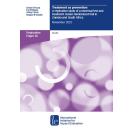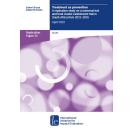Impact of unconditional cash transfers: a replication study of the short-term effects in Kenya
3ie Replication paper 20, 2019
Wang and colleagues replicate the results of a randomized evaluation carried out by Haushofer and Shapiro in 2016. The original study used randomization to examine the overall effects of a large unconditional cash transfer program. The original study also examined the differential effects of transfer magnitude (large versus small), transfer recipient (husband versus wife), and transfer timing (monthly versus lump sum) across eight domains including assets, revenue, expenditure, food security, health, education, psychological well-being and female empowerment. Households receiving unconditional cash transfers had higher household consumption, asset holding, monthly income, and better food security and psychological well-being. While lump sum transfers led to higher levels of asset holdings, monthly payments were more likely than lump sum transfers to increase food security. Large cash transfers increased asset holdings and improved psychological well-being more than small cash transfers.
The replication researchers conducted a push-button replication, a pure replication, and then extended their analysis to examine model validation and model specifications. The replication results were consistent with the findings from the original study. The short-term impacts of unconditional cash transfers on household consumption, assets, income, food security and psychological well-being were sustained when conducting robustness checks using a variety of methods as well as different model specifications. The principal component analysis on measuring the indices, however, suggested further examination of alternative measures of food security, health and psychological well-being.

